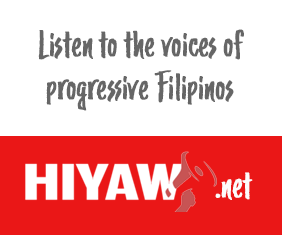Unity Statement of the National Oil Palm Conference
09-10 May 2015
Davao City, Philippines
The palm oil industry is promoted as a “sunshine industry” now among the Philippine government’s priorities. Palm oil is one of the most highly-traded commodities at the global level. Oil palm is touted as a “tree of peace” with its promises of livelihood and development, food security, poverty alleviation and economic stability.
The reality however, speaks differently.
Farmers, agricultural workers, mill workers and indigenous peoples in Mindanao, Palawan and other islands in the Visayas bear the brunt of innumerable negative effects brought about by the oil palm promise. We now raise these urgent issues with regard the government’s rapid and destructive drive to prop up the palm oil industry.
Thirty years of the palm oil industry only proved broken promises of development, livelihood, and food security. The people’s access to food and ownership and control of land has been undermined by massive crop and land use conversion from staple food production to oil palm.
The first oil palm plantations in the country made expansion possible through land accumulation by dispossession. This drive became even more aggressive during the past decade or so resulting in the dislocation of entire peasant and indigenous peoples communities. Oil palm plantations forced their way into these communities without respect for indigenous peoples’ ancestral domain, desecrating ancestral burial sites and other important aspects of indigenous peoples’ tradition and culture.
Aggressive landgrabbing by foreign oil palm companies in cahoots with their local partners is complemented by state-sponsored violence, coercion and deception. Militarization has spawned an alarming spate of human rights abuses and violations of civil and political rights. Farmers, indigenous peoples, their leaders and the support groups opposed to oil palm expansion have become targets of threat, harassment, trumped-up charges, and extra-judicial killings. We recall to mind the lives offered by Gilbert Paborada, Rolen Langala and Marcel Lambon, among others, for resisting oil palm plantation expansion in defense of their respective communities.
The Philippine Palm Oil Development Council (PPDCI), government agencies such as the Department of Agriculture (DA), Department of Agrarian Reform (DAR), Department of Environment and Natural Resources (DENR), Philippine Coconut Authority (PCA), National Commission for Indigenous Peoples (NCIP) as well as government banks have practically legalized dispossession and violation of land rights through onerous agribusiness venture agreements (AVAs) under the Comprehensive Agrarian Reform Program (CARP) and community based forest management (CBFM) contracts. The ideals of land reform and environmental protection have been used to advance corporate greed and to protect the interests of transnational companies and local bureaucrats with stakes in palm oil production.
Farmers and supposed agrarian reform beneficiaries have been relegated to being landless agricultural workers enduring heavy toil, hazardous working environments and slave wages. Agricultural and mill workers are made to accede to unfair labor practices and labor flexibilization policies. Peasant and labor unrest in the Caraga region where the early oil palm plantations and oil mills in the country were established, confirm how corporate interests breed widespread destitution, child labor, marginalization of women, and rampant violations of labor standards such as the right to organize unions and occupational health and safety. The use of harmful agrichemicals in oil palm cultivation such as Furadan, Glyphosate and Paraquat poses health hazards not only to farm workers directly handling these toxic materials but also to entire communities affected by the contamination of water systems.
Environmental problems related to oil palm are a cause for urgent concern not only to the peasants, agricultural workers and indigenous peoples in the immediate vicinity of the plantations. The Philippine government’s aggressive drive to convert one million hectares of land for oil palm in the next few years will result in massive destruction of forests, loss of biodiversity, and will inevitably contribute to the global problem of climate change. The past few years proved that the Philippines is no stranger to the unspeakable impact of natural calamities aggravated by environmental degradation and climate change. Critical issues surrounding oil palm must be effectively tackled with urgency in light of the irreversible ecological impact that will affect future generations.
We gather here today to register the following calls:
End corporate-driven land grabbing!
Uphold the people’s right to food, no to land use and crop conversion!
Respect indigenous people’s right to a self-determined development!
Respect labor rights, uphold workers’ right to organize unions and collective bargaining inside oil palm plantations and oil mills!
Stop human rights violations, pull out military troops from oil-palm operation-affected communities!
Ban hazardous chemicals and pesticide, uphold people’s right to health and a safe environment!
Genuine agrarian reform and national industrialization, now!
We declare today the establishment of a network opposed to the oil palm plantations in the Philippines, the Task Force NO PALM (or Network Opposed to Oil Palm Plantations) to serve as a platform for coordination, research, education, information dissemination and other campaign-related efforts, and as a stepping stone for the eventual establishment a broad and strong mass movement against oil palm plantations in the country in the future.
———————–
The Unity Statement is a product of the National Oil Palm Conference organized by the Center for Trade Union and Human Rights (CTHUR), Rural Missionaries of the Philippines-Northern Mindanao Sub-Region (RMP-NMR) and the Hongkong-based Asia Monitor Resource Centre (AMRC) on 09-10 May 2015 at Davao City. The Conference was attended by 30 individuals representing 20 organizations—of indigenous peoples, farmers, trade unions, agricultural workers and advocates — coming from Luzon and Palawan and Mindanao, with a participant from Indonesia.
For reference:
Ms. Daisy Arago
Executive Director, CTHUR
E: [email protected]
Ms. Joy Hernandez
Program Coordinator, AMRC
E: [email protected]
Sr. Ma. Famita N. Somogod, MSM
Coordinator, RMP-NMR
E: [email protected]
RURAL MISSIONARIES OF THE PHILIPPINES-Northern Mindanao Sub-Region (RMP-NMR), Inc
Room 01, Kalinaw Lanao Center for Interfaith Resources
0016 Bougainvilla Puti, Villaverde
9200 Iligan City, Philippines
T/F: +63 (63) 223 5179
E: [email protected]
S: rural.missionaries
W: www.rmp-nmr.org



